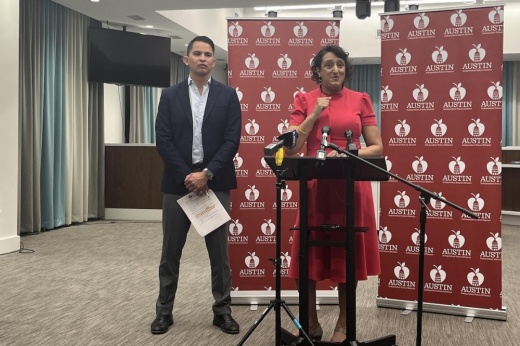What's happening
On March 31, the Texas Education Agency informed Austin ISD it would seek to implement a conservatorship due to Austin ISD's backlog of special education evaluations and failure to complete past TEA corrective measures.
The gist
In 2021, the TEA began investigating Austin ISD over complaints that the district failed to comply with state timelines for providing special education evaluations for students. The state found 40 violations since the 2020-21 school year, according to the final report.
Under the conservatorship, a few individuals chosen by the state will work with the district to identify issues and solutions within the special education department, Austin ISD Board President Arati Singh said. The state is also recommending an outside audit.
The conservators will have the power to make binding resolutions, Singh said.
"This would not be a takeover of the school district as is currently happening in Houston ISD," Singh said.
Singh said while it was not "groundbreaking or shocking" the state recommended a conservatorship, she had hoped the TEA would recommend a monitor for the district, which would be a lower level of intervention. She said she does not anticipate the situation to evolve into a takeover of the board.
Austin ISD can choose to appeal the decision. Trustees will discuss that option at their April 3 meeting, Singh said.
How we got here
Interim Superintendent Matias Segura said the district has 72 positions for educational diagnosticians and licensed specialists in school psychology and only 21 of those are filled. He said there are only about 250 people licensed to provide those services in Central Texas, making it hard for the district to fill the openings.
According to Austin ISD;
- As of March 20, the district had 1,808 initial evaluations and reevaluations that were overdue.
- The district has completed more than 8,000 evaluations since March of 2021.
- More than 4,000 of those evaluations were completed between May 2022 and March 2023.
- An additional 1,263 new evaluations have been requested since January.
In 2021, advocacy group Disability Rights Texas filed a lawsuit against the district for failing to serve special education students. In Feb. 2023, the group asked the TEA to consider action against the district over the issue.
Singh said the district had a backlog before the pandemic, but when COVID-19 forced the district to move remote it led to 18 months where evaluations could not be completed as they require in-person work with students and families.
"So that backlog really increased," Singh said. "Now we have students coming into school, they haven't had a consistent educational experience or consistent educational opportunity for an extended period of time. And so what might look like a learning delay might actually just be a student who has not had the exposure to educational opportunities."
Singh said this means there is a higher volume of evaluations requested and each must be handled carefully to differentiate between learning loss and special education needs.
What the report says
"AISD has continuously failed to meet special education requirements under federal and state statutes regarding initial evaluations, eligibility, [individualized educational plans], placement determinations, and the provision of special education and related services to qualifying students," the report reads.
The plan
The district is considering significant wage increases for these positions as part of its 2023-24 budget, Segura said.
Both Segura and Singh said Austin ISD has already been working with the state to improve services for students and the board and administration have been collaborating more closely than in the past.
Other steps cited by Austin ISD include;
- Creating a centralized system to track evaluations and support special education services
- Working with special education expert Frances Stetson to improve district training and procedures
- Launching a recruitment effort to hire diagnostic staff including up to $20,000 in annual incentives
- Forming a committee of board leadership to monitor progress
- Communicating with the public
The board of trustees called a special meeting for April 3 to discuss the state agency's involvement in the district.
Community members can sign up to submit recorded comments between 7:45 a.m. and 3 p.m. on April 3.





